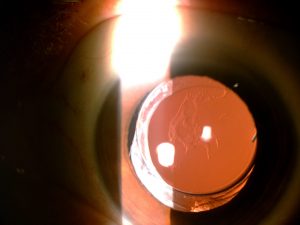Posterior Capsular Opacification (PCO)
What is Posterior Capsular Opacification (PCO)?
Posterior capsular opacification (PCO) is a condition that occurs after cataract surgery. It is the most common complication of cataract surgery and can cause blurred or cloudy vision. PCO happens when the thin, clear membrane (capsule) that holds the artificial lens in place becomes cloudy.

Posterior Capsular Opacification
What are the symptoms of PCO?
- Blurred or hazy vision
- Difficulty seeing in low light conditions, particularly driving at night
- Glare or halos around lights
- Difficulty reading
What causes PCO?
PCO happens when the cells within the capsule that holds the artificial lens start to grow and multiply. This causes the capsule to thicken and become cloudy, which can lead to blurred or cloudy vision. The exact cause of why some people develop PCO after cataract surgery and others do not is not fully understood. However, some factors that may increase the risk of developing PCO include:
- Age: The risk of developing PCO increases with age.
- Inflammation: Inflammation during the cataract surgery can increase the risk of PCO.
- Diabetes: People with diabetes may have a higher risk of developing PCO.
- Genetics: Some people may be genetically predisposed to developing PCO.
How common is PCO?
PCO is a common complication of cataract surgery. It is estimated that up to 20% of people who have had cataract surgery will develop PCO within 2 years of their surgery.
How is PCO diagnosed?
PCO is diagnosed by an eye doctor (ophthalmologist) during a routine slit-lamp eye exam after dilating the pupils.
How is PCO treated?
Visually significant PCO is treated by a simple out-patient, office based laser procedure to clean the lens called YAG capsulotomy. During this procedure, the doctor will use a laser to create a small hole in the cloudy capsule. This allows light to pass through the capsule and reach the retina, improving vision. This is a painless procedure and takes about 2-3 minutes to complete. The procedure is performed on an outpatient basis and does not require any incisions or stitches.
Is the procedure painful?
Most people do not experience any pain during a YAG laser capsulotomy. Some people may feel a mild pressure sensation or see bright flashes of light during the procedure. Eye drops are used to numb the eye before the procedure, so you should not feel any discomfort.
What happens if PCO is not treated?
PCO is not a serious disease nor is it an emergency. If it is not treated, it will increase with time and cause deterioration of vision. The rate of progression of PCO varies from patient to patient.
What are the complications of YAG capsulotomy?
YAG capsulotomy is a safe and painless procedure. No rest or restriction is advised after YAG capsulotomy. Like any medical procedure, there are risks and complications associated with YAG laser capsulotomy. Rare complications include: spike in intra-ocular pressure, macular swelling and retinal detachment (extremely rare). These risks are uncommon and the procedure is generally considered safe.



